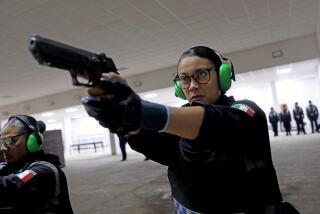Making Peace in Central America : Neutral Outsiders Can Exert Political, Financial Leverage
- Share via
As 1989 begins, Central America is caught between the harsh reality of war and the lingering promise of peace.
Almost 200,000 people have been killed in the internal conflicts of El Salvador, Guatemala and Nicaragua, and more than 2 million have been uprooted from their homes. Much of the region’s physical infrastructure lies in ruins or disrepair. Hurricanes, drought and earthquakes have taken a heavy toll, but the worst destruction has been wreaked by war.
Yet even as Central America’s suffering continues, broad agreement has finally emerged on what must be done to end it. The blueprint exists in the Esquipulas accord--the proposals put forward in 1987 by President Oscar Arias Sanchez of Costa Rica and adopted by the five Central American presidents when they met in Guatemala that August. But this blueprint will be useless unless there is a resolution of the confrontation between the governments of Nicaragua and the United States.
At this juncture the prospects for peace between the United States and Nicaragua depend on Washington’s first making clear its terms for restoring normal relations with the Sandinista government. If the new U.S. Administration and Congress believe that the very existence of the Sandinista regime in Managua, because of its character and ideology, threatens U.S. security interests, then the United States may see no long-term alternative to attempting to oust the Sandinista government, in the meantime continuing its unremitting hostility toward Nicaragua. Such an approach almost certainly would condemn Central America to many more years of confrontation, destruction and despair.
We strongly urge a different tack. We do not believe that the Sandinista regime,by its mere existence, poses the kind of security threat that could justify direct or indirect military or paramilitary intervention by the United States. The emphasis of U.S. policy should be not on overthrowing the government of Nicaragua but on ensuring that its activities do not threaten the security of other countries. On this key point there is broad agreement both in Latin American and in the United States.
To deter any future threat to its security, the United States should obtain satisfactory assurances from the Soviet Union and Cuba that they will curtail their military ties to Nicaragua. The United States should also resume direct bilateral talks with the government of Nicaragua in order to fashion mutual security arrangements.
While negotiating on security issues, the U.S. government should continue trying to foster political competition in Nicaragua. By alleviating its security concerns, the United States should be able to concentrate more effectively--in concert with other democratic countries--on promoting pluralism and democracy everywhere in Central America. This aim is more likely to be achieved, over time, through internal pressure and consistent multilateral inducements rather than through unilateral imposition or intimidation.
Central America’s security ultimately depends on fashioning internal agreements that allow all major groups to participate fully in political life and thereby acquire a stake in civic peace. That is why the Esquipulas peace process focuses on fostering national reconciliation and political pluralism.
It is, however, much easier to profess a commitment to democracy than to carry it out. Most of Central America today is still a long way from political pluralism and constitutional democracy. Abuses of human rights and restrictions on open political activity are all too common in El Salvador, Guatemala, Honduras and Nicaragua. In Guatemala, El Salvadorand Honduras, military and police forces ignore or resist civilian political authorities. In these three countries, institutions are weak and vulnerable to corruption. In Nicaragua, Sandinista Party control of the armed forces raises serious questions about the regime’s willingness to accept autonomous opposition--the basic prerequisite for peaceful political competition.
Even if Central America’s armed conflicts can soon be halted or sharply reduced, pluralist politics will take many years to build. These societies have become intensely polarized, and their deep divisions have to be healed. The rules of politics still have to be devised through broad consultation and agreed on by the main social actors. Civic trust must be earned reciprocally among the main contenders for power.
A whole network of institutions must be built to make effective democracy possible. Independent judiciaries must be created; political parties, professional associations, interest groups and other nongovernmental organizations must be fostered and strengthened; the media must become more competent and professional and be allowed to provide information independent of the dictates of ruling groups, and civilian control of the armed forces must be firmly established.
National reconciliation, combined with steady progress toward pluralism and democracy, is essential to achieve a lasting peace in Central America. The genius of Esquipulas was its marshaling of concerted, symmetric and reciprocal external pressures on Central America’s countries to open up on competitive politics. Continuation of such pressure, accompanied by incentives, is much more likely than military action--or mere exhortation--to promote democracy. What is urgently needed now is a strategy for bringing international influence to bear more effectively.
We recommend three concrete steps:
--We urge the five presidents of Central America to request the United Nations or the Organization of American States to establish an independent international committee to evaluate compliance with the political provisions of Esquipulas. Such a body--which might include Canada, Spain and West Germany, for example--should be responsible for reporting on violations of human rights, monitoring freedom of assembly and expression, and observing political campaigns and elections.
Unlike the short-lived verification and follow-up commission established after Esquipulas, the new evaluation committee should be composed of a small number of countries accepted as impartial by the five Central American governments; it should have unimpeded access to all five nations, and should issue periodic public reports on progress toward achieving the Esquipulas commitments.
--International pledges of significant economic assistance should be conditioned on good-faith efforts by the Central American governments to negotiate solutions to the armed conflicts as well as on their satisfactory implementation of the Esquipulas commitments regarding political pluralism and peaceful political competition. Until progress on both these dimensions has been achieved, international economic assistance should be limited to humanitarian relief for the victims of war.
--The international community should organize a consultative group to mobilize resources in support of the Esquipulas process. Specifically, the group should coordinate economic development assistance, tying it tightly to each country’s progress in implementing the Esquipulas provisions, as evaluated by the recommended independent body. Positive incentives and sanctions for non-compliance should be based on a reasonable timetable for progress toward pluralism and democracy, taking into account each country’s circumstances.
More to Read
Sign up for Essential California
The most important California stories and recommendations in your inbox every morning.
You may occasionally receive promotional content from the Los Angeles Times.










